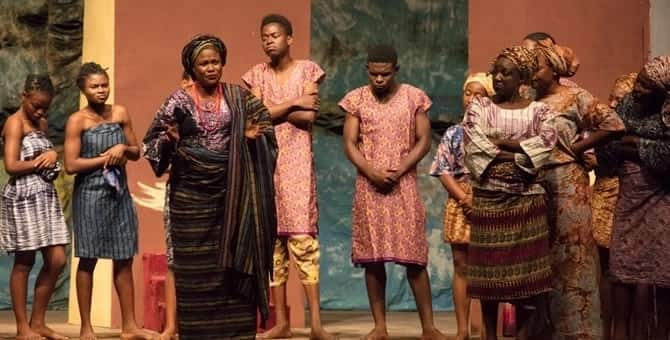With the coming of colonialism, drama moved from grove theatre to the stage. Many indigenous dramatic forms underwent some changes too. As stated by Oyin Ogunba and Abiola Irele “before the advent of the Whiteman, Africans did not have “theatres” in the Western or oriental sense. Nobody built structures specially designated “playhouses” which served the purpose of entertainment or dramatic instruction and nothing else”. Though there were arenas for performances, they were not constructed in a strict geometric dimension like those of the ancient Greeks”.
In Nigeria, three prominent names in the theatrical tradition are Hubert Ogunde, Kola Ogunmola, and Duro Ladipo. The rise of the theatre tradition in Nigeria has been traced to Hubert Ogunde, who is considered the father of this tradition in Nigeria, and whose theatre career began under the patronage of the church in the 1940s. Ogundele has also informed that Ogunde has the credit of freeing the traveling theatre from the constricting church patronage. But according to Adedeji (1981) and Julius-Adeoye (2013), the Ogunde Theatre and other contemporary traveling theatres have their origins in the traditional Yoruba Alarinjo theatre. But Wole Ogundele (1997) has stated that: “although the Yoruba traveling theatre had its immediate beginnings in the Victorian Lagos of the 1930s and 1940s, in church end-of-year and harvest concerts and plays, it soon outgrew these to discover its root in the Yoruba Alarinjo (or Oppidan) masquerade performance practices that predate colonialism by centuries”.
The Alarinjo theatre emerged from the dramatic roots of the Egungun. Born in 1916, in Western Nigeria, Herbert Ogunde is considered an important figure in the theatrical tradition in Nigeria. He took inspiration from the bible and the socio-political life of his time. His first opera, titled The Garden of Eden and the Throne of God, was produced in 1944. Ogunde wrote social satirical plays like Human Parasites: a tragedy in two acts, in which he satirized the vulgarity and ostentatiousness of his time. Some of Ogunde’s socio-political dramatic works include Tiger’s Empire, Bread and Bullet, and Strike and Hunger, among others. The Ogunde Theatre was prominent within and outside the shores of Nigeria. Ebun Clark records that the Ogunde Theatre went on tour to countries such as Ghana and England.
E.K Ogunmola was another prominent figure in the history of theatre in Nigeria and Africa at large. According to Julius-Adeoye, Ogunmola began his professional theatre practice in 1948 with Reign of the Mighty. Some of his dramatic works include Joseph and his Brethren, and Love of Money. Julius-Adeoye notes that Ogunmola’s plays drew influences both from the bible and Yoruba folk tales. Julius-Adeoye also states that although Ogunmola acknowledge the influence of Ogunde on his theatre, however, he refrained from overt political plays such as Ogunde’s Bread and Bullet and Strike and Hunger. Ulli Beier notes that Oginmola also produced Amos Tutuola’s The Palmwine Drinkard on stage.
Born in 1931, Duro Ladipo began his career by introducing some Yoruba dramatic and musical aesthetics into some Christian celebrations such as the Easter festival. According to Yemi Ogunbiyi, Duro Ladipo was different from the other three Nigerian theatre figures in that despite his extensive country-wide tours, Duro Ladipo remained in Oshogbo, basically to the end. This is unlike others who gravitated to the big cities of Lagos and Ibadan. As stated by Julius-Adeoye, the source of Ladipo’s materials is the Yoruba mythological world, bible stories, and everyday subjects. Ogundele has also credited Ladipo for infusing traditional elements into the theatre practice, with the introduction of bata and dundun drums during Christian cantata performances. The church frowned against this idea, and this led to Ladipo leaving the church to become a full-time actor, director, and producer. Some of his productions include Oba Koso, Moremi, and Oba Waja. Duro Ladipo is acclaimed for drawing on Yoruba history and myths, as well as traditional Yoruba secular and religious songs. It is against this background that Ogundele opines that Duro Ladipo’s plays renewed the sense of cultural nationalism. As stated by Ogunbiyi, as a dramatic spectacle, Oba Koso is probably unsurpassed among Duro Ladipo’s works. Ogundele has stated that the suppression of the stage by either television studio stage or video location came via film, noting that in the late 1970s Ogunde started producing plays with brief film insertions in them. We shall consider the transition from drama to video film in a subsequent section.




